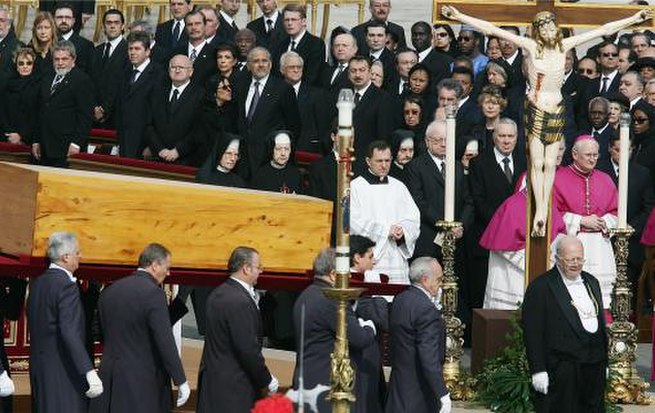
Main Difference
The main difference between Funeral and Burial is that the Funeral is a ceremony for a person who has died and Burial is a ritual act of placing a dead person into the ground.
-
Funeral
A funeral is a ceremony connected with the burial, cremation, etc. of the body of a dead person, or the burial (or equivalent) with the attendant observances. Funerary customs comprise the complex of beliefs and practices used by a culture to remember and respect the dead, from interment itself, to various monuments, prayers, and rituals undertaken in their honor. Customs vary widely both between cultures and between religious groups and denominations within cultures. Common secular motivations for funerals include mourning the deceased, celebrating their life, and offering support and sympathy to the bereaved. Additionally, funerals often have religious aspects which are intended to help the soul of the deceased reach the afterlife, resurrection or reincarnation.
The funeral usually includes a ritual through which the corpse of the deceased is given up. Depending on culture and religion, these can involve either the destruction of the body (for example, by cremation or sky burial) or its preservation (for example, by mummification or interment). Differing beliefs about cleanliness and the relationship between body and soul are reflected in funerary practices. When a funerary ceremony is performed but the body of the deceased is not available, it is usually called a memorial service or celebration of life.
The word funeral comes from the Latin funus, which had a variety of meanings, including the corpse and the funerary rites themselves. Funerary art is art produced in connection with burials, including many kinds of tombs, and objects specially made for burial with a corpse.
-
Burial
Burial or interment is the ritual act of placing a dead person or animal, sometimes with objects, into the ground. This is accomplished by excavating a pit or trench, placing the deceased and objects in it, and covering it over. Most would agree that humans have been burying their dead since shortly after the origin of the species. Burial is often seen as indicating respect for the dead. It has been used to prevent the odor of decay, to give family members closure and prevent them from witnessing the decomposition of their loved ones, and in many cultures it has been seen as a necessary step for the deceased to enter the afterlife or to give back to the cycle of life.
Methods of burial may be heavily ritualized and can include natural burial (sometimes called “green burial”); embalming or mummification; and the use of containers for the dead, such as shrouds, caskets, grave liners, and burial vaults, all of which can retard decomposition of the body. Sometimes objects or grave goods are buried with the body, which may be dressed in fancy or ceremonial garb. Depending on the culture, the way the body is positioned may have great significance.
The location of the burial may be determined taking into account concerns surrounding health and sanitation, religious concerns, and cultural practices. Some cultures keep the dead close to provide guidance to the living, while others “banish” them by locating burial grounds at a distance from inhabited areas. Some religions consecrate special ground to bury the dead, and some families build private family cemeteries. Most modern cultures document the location of graves with headstones, which may be inscribed with information and tributes to the deceased. However, some people are buried in anonymous or secret graves for various reasons. Sometimes multiple bodies are buried in a single grave either by choice (as in the case of married couples), due to space concerns, or in the case of mass graves as a way to deal with many bodies at once.
Alternatives to burial may include cremation, burial at sea, promession, cryopreservation, and others. Some human cultures may bury the remains of beloved animals. Humans are not the only species which bury their dead; the practice has been observed in chimpanzees, elephants, and possibly dogs.
-
Funeral (noun)
A ceremony to honour and remember a deceased person. Often distinguished from a memorial service by the presence of the body of the deceased.
“No one likes to go to funerals.”
-
Funeral (noun)
A funeral sermon.
-
Funeral (adjective)
alt form of funereal
-
Burial (noun)
The act of burying; interment
-
Funeral (noun)
a ceremony or service held shortly after a person’s death, usually including the person’s burial or cremation
“in the afternoon, he’d attended a funeral”
“a funeral service”
-
Funeral (noun)
a sermon delivered at a funeral
“the community would call him to preach the funeral”
-
Funeral (noun)
a procession of mourners at a burial
“her funeral had to pass”
-
Burial (noun)
the action or practice of burying a dead body
“his remains were shipped home for burial”
-
Burial (noun)
a ceremony at which someone’s body is buried; a funeral
“burial rites”
“they will give him a proper burial”
-
Burial (noun)
a grave or the remains found in it
“burial mounds”
